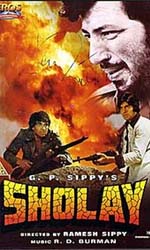Sholay
Sholay - The Movie
Sholay Cast
Sholay Story
Impact of Sholay
Inspirations
Production
Awards
Sholay Dialogues
Songs of Sholay
Sholay Remake
Sholay - Inspirations
The theme and essence of Sholay was inspired by several films from Hollywood and India. The adventure and drama prevelant in the film was inspired from the Westerns, especially Sergio Leone's Spaghetti Westerns, with which the writer and director were influenced by. The theme of a village grouping or hiring gunmen to protect itself from bandits was inspired from The Magnificent Seven (1960), and The Seven Samurai which again was the inspiration for The Magnificent Seven. The theme of two light-hearted outlaws came from Butch Cassidy and the Sundance Kid (1969), on which the writers wanted to base the characters of Jai and Veeru.
The Indian films which were an inspiration were Raj Khosla's Mera Gaon Mera Desh (1971) (translated to My Village My Country) and Narendra Bedi's Khote Sikkay (1973). Mera Gaon Mera Desh was the story of a one-armed man who reforms a petty criminal and uses him to protect their village agasint dacoits.
The music for the song Mehbooba was taken from a song by Demi Russo, which the director liked. The name and violence of Gabbar Singh was adopted from a real-life dacoit of the same name who was a menace in the villages around Gwalior in the 1950s. He was known to capture the police and cutoff their ears and noses. For the preparation of the role, Amjad Khan read Abhishapth Chambal, a book on Chambal dacoits written by Taroon Coomar (the film's herioine Jaya Bhaduri's father).
The names of Veeru and Jai came from writer Salim's friends while in college, and the name of Thakur came from Thakur Baldev Singh who was Salim's father-in-law. The recurring theme throughout the film of the same-sided coin came from Garden of Evil (1954) starring Gary Cooper. The looks and dialogue delivery of the short but popular role of the jailor played by Asrani were an imitation of Hitler. The jailor's laughter was an imitation of Jack Lemmon in The Great Race (1965).
